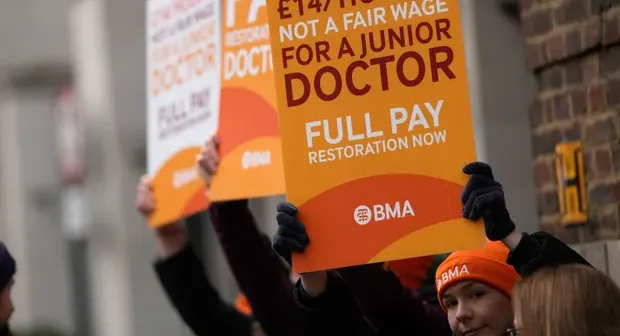unior doctors across England have begun a four-day strike that will result in an estimated 350,000 appointments including operations being cancelled.
Doctors will mount picket lines outside hospitals from 7am until Saturday morning in a deteriorating dispute over pay. It is the longest industrial action in the health service since nurses, ambulance crews and other health workers took action last year.
NHS managers have said patient care is “on a knife-edge” and “very fragile” because of the stoppage by members of the British Medical Association (BMA).
The chief executive of the NHS Confederation, Matthew Taylor, said the likely impact of the strike was “heartbreaking” and called on both sides to end their “battle of rhetoric”.
On Monday, Taylor, who heads the body that represents the healthcare system in England, Wales and Northern Ireland, said up to 350,000 appointments and operations would be cancelled this week.
He said he hoped everyone who needed urgent care would get it, but added: “There’s no point hiding the fact that there will be risks to patients – risks to patient safety, risks to patient dignity – as we’re not able to provide the kind of care that we want to.”
Prof Sir Stephen Powis, the national medical director of NHS England, said “cover is very fragile” during the BMA strike and urged the public to “use the NHS’s services wisely”.
He told BBC Radio 4’s Today programme on Tuesday: “Our advice to the public is to think carefully because we will be seeing a lot of disruption over the next four days.
“We are … working very hard to ensure those emergency services are kept safe, that is our priority, but I’ve also got no doubt that that cover is very fragile, so we are relying on consultants and other staff to cover the work that junior doctors usually do.
“Junior doctors are a significant part of our medical workforce – up to 40 to 50% of our medical staff – and so that cover is stretched thin in places, so it could be affected by sickness, by absence for other reasons.
“So we will endeavour to keep patients safe, particularly in those emergency services but that is becoming harder every time we have this strike action.”
He added: “Routine care will be affected … this will take weeks to recover from. Strike action such as this does have a significant disruptive effect.”
The health secretary, Steve Barclay, called the strikes “extremely disappointing” and said the BMA’s demand for a 35% pay rise was unreasonable as it would result in some junior doctors receiving a pay rise of more than £20,000.
He said: “People should attend appointments unless told otherwise by the NHS, continue to call 999 in a life-threatening emergency and use NHS 111 online services for non-urgent health needs.”
The shadow health secretary, Wes Streeting, said: “The junior doctors’ strike this week will cause huge disruption to patient care. Where is the prime minister and why hasn’t he tried to stop it?
“Rishi Sunak says he wouldn’t want to get in the middle of NHS pay disputes. Patients are crying out for leadership but instead they are getting weakness.”
New advertisements by the BMA show how much junior doctors are paid for their roles in surgical procedures. Three doctors with 10, seven and one year’s experience are pictured in an operating theatre where an appendix is being removed, one of thousands of similar operations that takes place every day in England.
For the 60-minute procedure, they would be paid £28, £24.46 and £14.09 respectively, a total of £66.55 for a potentially life-saving procedure, says the BMA. The union has estimated that the pay of junior doctors has fallen by 26% in real terms over the past 15 years.
Dr Robert Laurenson and Dr Vivek Trivedi, the BMA junior doctors committee co-chairs, said: “It is appalling that this government feels that paying three junior doctors as little as £66.55 between them for work of this value is justified. This is highly skilled work requiring years of study and intensive training in a high-pressure environment where the job can be a matter of life and death.
“Why then has the government allowed junior doctor pay to be cut in real terms by over a quarter in the last 15 years?”

